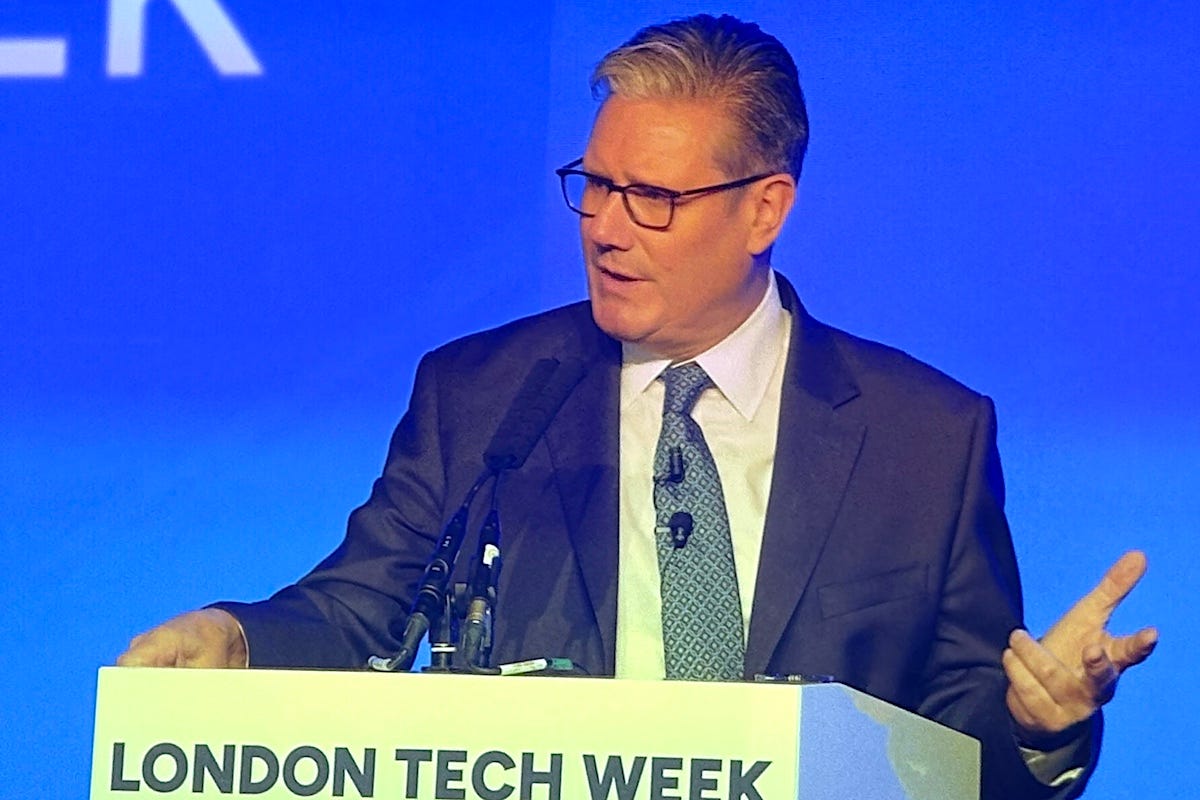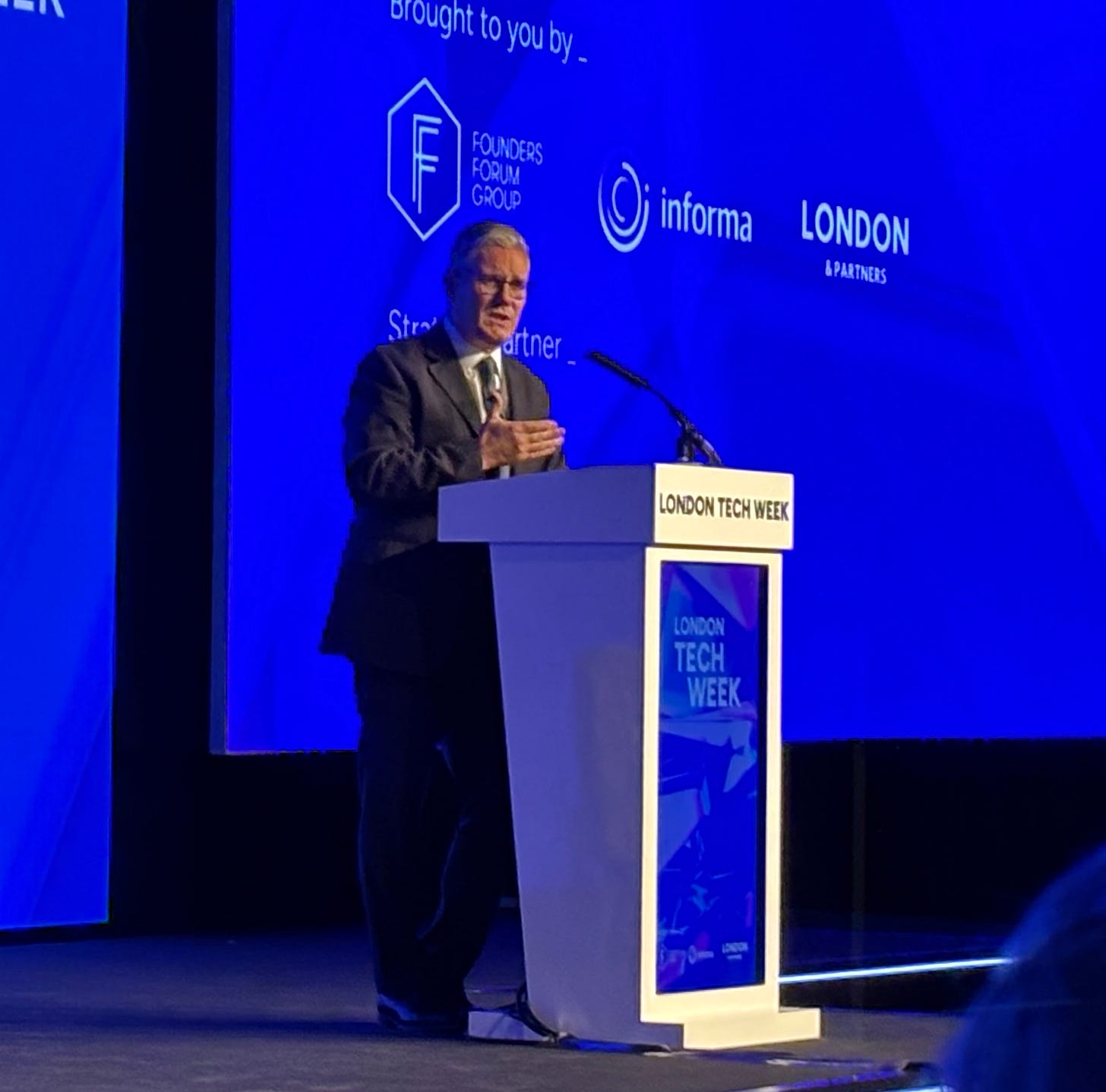UK Unveils New Investment to Boost National AI Development
The Prime Minister outlines plans to embed AI in public services, train millions, and attract global tech investors
The UK government has committed £1 billion to expand its national computing power by a factor of 20, a move Prime Minister Keir Starmer called essential to transforming Britain into an artificial intelligence powerhouse.
The announcement, made at London Tech Week on June 9, 2025, is a cornerstone of the government’s broader AI strategy to strengthen digital infrastructure, improve public services, and drive economic growth.
“We can be an AI maker, not just an AI taker,” Starmer said during his keynote address, laying out a vision for how cutting-edge technology can be integrated into the fabric of national life. “More importantly, it means we have the digital infrastructure we need to make sure AI improves our public services.”
The plan, which the Prime Minister called a “shared mission,” focuses on embedding AI in critical areas such as health, education, housing, and national security. The new investment builds on a detailed AI Opportunities Action Plan introduced earlier this year, which included 50 recommendations—all accepted by the government.
The announcement also marks a coordinated effort to build public trust in artificial intelligence and accelerate its responsible adoption.
“I’ve always said: AI and tech make us more human. It may sound like an odd thing to say, but it’s true—and we need to say it,” Starmer noted. “Because some people out there are sceptical. They worry about AI taking their jobs… But in every case, you can show AI innovation making a difference for working people.”
Public sector transformation
The Prime Minister emphasized that artificial intelligence is already changing how government works—and that transformation is set to accelerate.
“I’ve set the challenge to all of my teams: show me how they can use AI—not just in the output of government but also in the very way we do government,” Starmer said.
One striking example is a government-developed tool called Extract, which digitises old, handwritten planning records at unprecedented speed. Piloted in Exeter, Westminster, and other councils, Extract can process 100 documents daily, compared to the previous average of five.
“Jobs that would otherwise have taken hours and hours—done in seconds,” Starmer said. “It turns into more growth and more opportunity. But most of all, it speeds up the future that we need.”
AI is also being trialled in hospitals to help accelerate patient discharge and in classrooms to assist teachers with personalising lesson plans. The government is exploring applications in immigration as well, to help clear the asylum backlog more efficiently.
In healthcare, Starmer recalled visiting a Midlands hospital where consultants used AI to pinpoint stroke-related brain clots in a fraction of the time.
“Brilliantly saving people’s lives,” he said. He also described AI-powered stethoscopes that predict heart problems before symptoms occur. “It’s hugely transformative what can be done here,” he said.
Beyond public services, Starmer positioned AI as central to national defence. In the UK’s latest Strategic Defence Review—commissioned by Starmer soon after taking office in July 2024—AI was embedded into future security planning.
He cited a recent trip to Ukraine and conversations with President Zelensky: “I was struck by the extent to which technology and AI are now having a direct impact in that conflict. In three years of conflict, the way that war is being fought has changed profoundly.”
Partnership and global ambition
Starmer said the UK’s tech ambitions depend on partnership with industry, investors, and international innovators.
“Our job as partners is to create the best possible conditions for you to succeed,” he told the audience. “That’s why events like this—and the conversations we have in the margins—are so important. Because we can only create the right conditions if we’re having that conversation.”
That spirit of collaboration was on display during his recent meeting with Nvidia CEO Jensen Huang in London on May 8. The two discussed the UK’s national AI strategy and plans to expand computing infrastructure.
On the morning of the keynote, Starmer joined Huang for a panel discussion. Huang, who had just confirmed Nvidia’s continued investment in the UK, praised the government’s focus on infrastructure and talent development.
“I would also like to thank Nvidia for partnering on a new pipeline,” Starmer said. “That allows us to expand their lab in Bristol, and that will make a huge difference to opportunity and jobs in the South West.”
Following the London event, Huang is scheduled to deliver a keynote speech at the Nvidia GTC Paris event on June 11 to elaborate on the company’s broader plans for AI in Europe.
Alongside government investment, private capital also flows in. Starmer welcomed a £1.5 billion investment from Liquidity, a US-based fintech firm, which will base its European headquarters in London.
“It means better access to finance for entrepreneurs right across the country,” he said, calling it “yet another vote of confidence in Britain today.”
He urged more global tech firms to follow suit and set up shop in the UK.
“What signal do we want to send to the rest of the world?” he asked. “The signal I want to send is this: a Britain that, after years of chaos, is a stable partner for investment. A Britain that believes the future should be shaped by our values. And that in this volatile world, is proud, unashamed, open for business.”
Talent, trust, and future inclusion
The final piece of the UK’s AI agenda is talent, and the scale of the government’s ambition is as bold as its infrastructure plan.
Starmer announced a partnership with 11 major companies to train 7.5 million workers in AI by 2030, and a new “tech-first” training programme to prepare up to 1 million young people with digital skills. The plan is backed by £185 million in public funding and aims to embed AI throughout the education system, starting with computer science in secondary schools.
At the university level, a new scholarship initiative will support high-performing students in AI research. Support will be available to help startups and SMEs recruit and retain tech talent.
“This is a package that should make a massive difference to the aspirations of working people,” Starmer said.
He highlighted the importance of inclusion, especially for young people from underrepresented backgrounds. Pointing to Somers Town, a low-income neighbourhood in his London constituency, Starmer praised Google AI’s decision to open a new campus next to a local school.
“I want the children in Somers Town to look out of their classroom windows and feel ‘yes, I can be part of that success. This could belong to me.’”
He added, "They can’t aspire to do something unless they can see, feel, and understand what it is. In this country, technology needs to be built in our brains.”
That sentiment underscores the Starmer government's broader vision: to build an innovative and inclusive tech-driven economy in which AI becomes a national advantage, not just a buzzword.
“By the end of this Parliament, we should be able to look every parent in the eye, in every region in Britain and say – look what technology can deliver for you,” Starmer said. “We can put money in your pocket; we can create wealth in your community; we can create good jobs and vastly improve our public services and build a better future for your children.”




